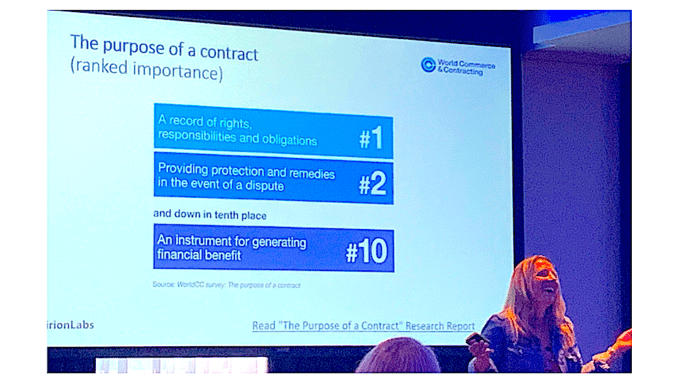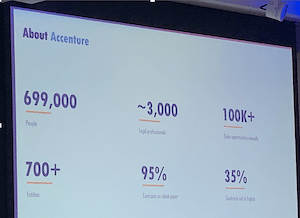
Last week Artificial Lawyer attended the World Commerce & Contracting (WCC) association’s London conference. There was plenty to see at what was very much a CLM-fest, but here are a few key observations.
Find Your North Star
‘Find your North Star’ is not a phrase this site had heard before in relation to legal tech or legal work, but it was something that was repeated multiple times by speakers at the WCC event.
In this case, the context is that before ploughing into a CLM implementation, or any other major project related to your contracting needs, you need to decide exactly where you are trying to get to, why you are trying to get there, and what ‘there’ will look like.
Once you’ve figured that out then you have a guiding light, a fixed axis by which to guide your journey across the sea of contracts in your business. This all sounds very sensible and should help to avoid the dreaded and often appearing ‘failed implementation’.
Roland Barthes and the Meaning of Contracts
One nugget of information, based on a survey by WCC and presented by its CEO, Sally Guyer (pictured above), was that when asked: ‘What is the purpose of a contract?’ the answer ‘An instrument for generating financial benefit,’ was ranked 10th out of ten possible options by those that WCC asked.
The top choice was that a contract is a ‘Record of rights, responsibilities and obligations.’
This is something of a problem, because as Guyer noted: ‘We have lost sight that a contract is a business instrument not [just] a legal instrument.’
And one has to say that when you look at the responses the two extremes neatly sum up a key challenge of contracts. I.e. the sales team and the CFO no doubt would look at a survey like WCC’s and put number 10 as number 1. The legal team would perhaps look at it all from 180 degrees in the opposite direction.
Also, if a contract is not a clearly defined thing in itself, does that mean that a contract is anything we say it is? Is it so subjective that whoever looks at one – and whatever their role is – is the key determining factor in what that document means to the business?
The short answer is: yes. Roland Barthes, the French philosopher, would probably say that it’s akin to his ‘Death of the Author’ thesis, i.e. that it doesn’t matter who wrote a certain novel, how they lived, or what they were trying to say, the only thing that matters in the real world is what the book means to a particular reader through the prism of their own lived experience.
It seems like Barthes would understand the contract problem very well.
Friction, Value and the Focus on Legal Risk
Another point that was made at WCC was that companies tend to let their inhouse legal and contracting teams get too carried away with legal risk reduction.
As Guyer pointed out, anything that causes friction in the contracting process is something that potentially is leading to higher costs and delays. She added that WCC will soon launch a Friction Index – which is an online assessment tool to help identify the percentage of value leakage you may be experiencing in your contracting process.
At another part of the event and during an impromptu workshop, one member of the gaggle of CLM-ers and contract managers said: ‘The challenge is the risk vs value focus. 90% of things in a contract [which have been strenuously and exhaustingly argued over] are never looked at again, but only 10% of the time [in the contracting process] is spent on the things that will actually run the contract.’
This, it would seem, can be translated to: ‘You’re ignoring the commercial aspects that really will matter to the business, and instead obsessing over legal risks that it’s highly unlikely will become relevant.’
Of course, a lawyer may then add: ‘Well, do you really want a contract that exposes you to more risk than is necessary?’
We then enter a debate about standardisation and also how CLM needs expert legal input. But that’s for another day.
The main takeaway from the workshop – and this site hadn’t expected it – was the awareness of a degree of antagonism expressed toward the lawyers in the business. In fact, after a particular comment one of the speakers in the group quickly added: ‘I hope there aren’t any lawyers here!’
There was a short silence and then a lady spoke up and said: ‘Actually, I’m a lawyer……’
Any road, once again we are seeing the challenges of who owns contracts inside the business, what they mean – and perhaps more accurately: what they should mean.
Not On My Paper
Last thing on WCC that this site saw, albeit very briefly, was a speech by someone from Accenture. Didn’t catch their name as was just leaving, but saw the slide below. They noted that despite the assumed reality that all inhouse teams are working mainly off their own paper, for Accenture – which has around 3,000 legal professionals – 95% of all the contracts their teams deal with are not their paper, but instead made using the clients’ paper.

In such a bespoke, client-heavy approach to contracting it must be very hard to find the same efficiencies a company that can rely on using its own paper will get. They added that they were working with a large CLM company all the same, but presumably the contract templating part of the offering was not getting as much use as it would with other companies.
P.S. SYKE Shares A CLM Story
Plus, just wanted to mention a great story shared by Lewis Bretts and Alistair Maiden at SYKE, who told the anecdote about a company that had put in a great new CLM system, but then it turned out that the use of template contracts wasn’t going well. They tried to figure out what the matter was.
It turned out that the company was still keeping a range of off-line templates entirely separate from the ones that had been integrated into the CLM system……so, the CLM’s all-singing, all-dancing tech was made practically useless.
So there you go. If you don’t really use the tech, one can’t expect it to deliver benefits.
Conclusion
It was a very illuminating experience. We can often forget that although 90% of discussions about legal tech revolve around what large commercial law firms and their lawyers want, the legal dimension of the client is very different. While they indeed have to handle complex legal challenges, they also are every hour looking back into the company and to its day-to-day contracting needs, which are not so much about mind-bending legal problems, as all about fundamental business issues that connect to sales, procurement and the overall financial strategy of the company.
This tension between legal input and commercial needs was definitely visible at WCC, but it’s perhaps a creative tension that as CLM becomes more and more widespread will result in some very positive results.